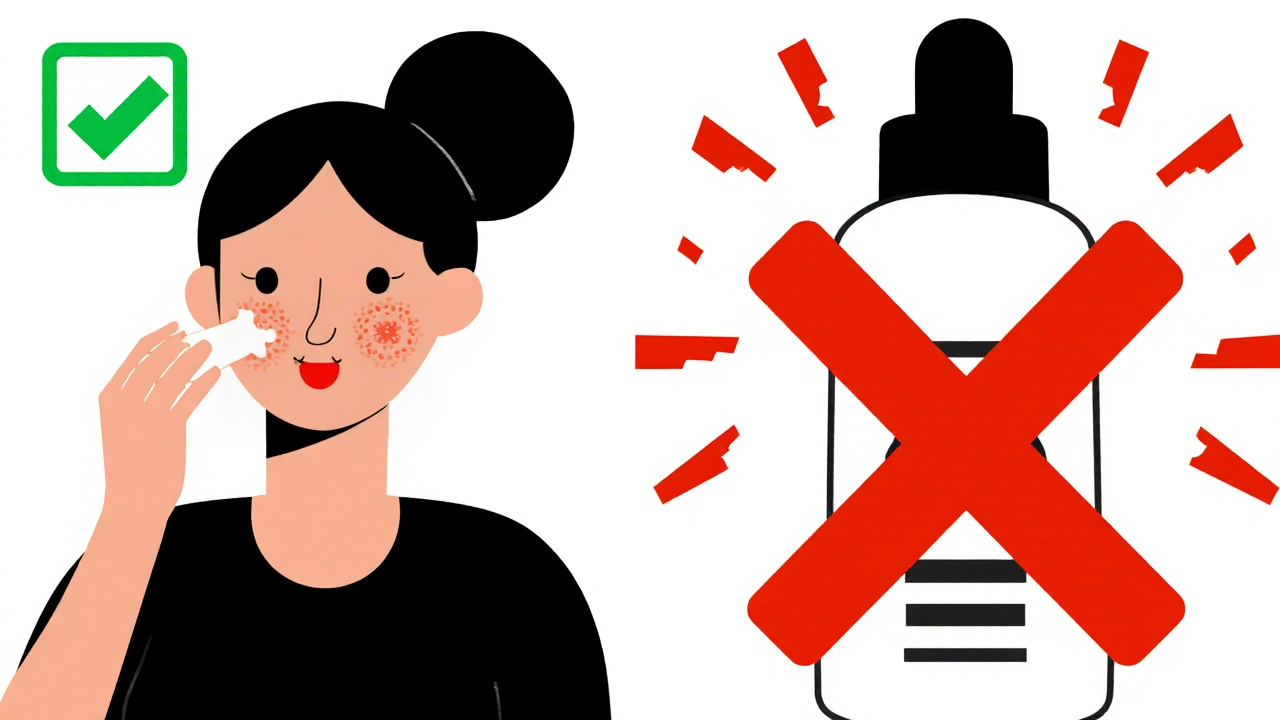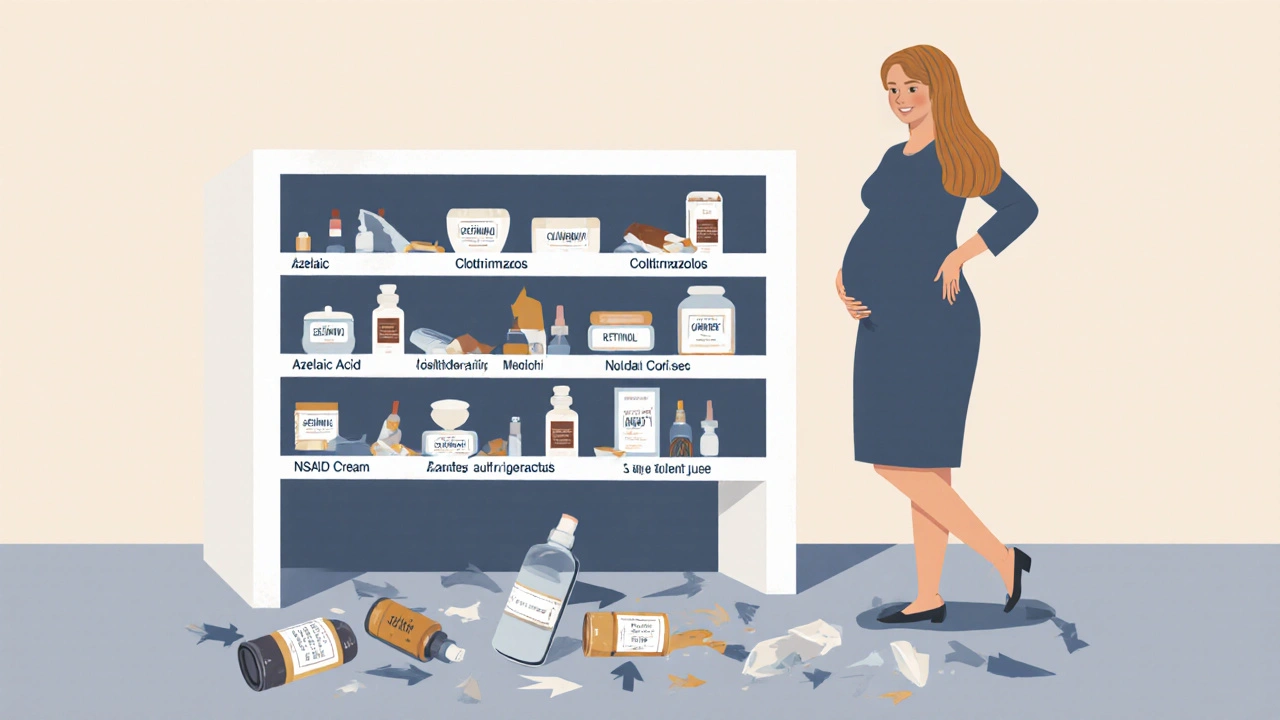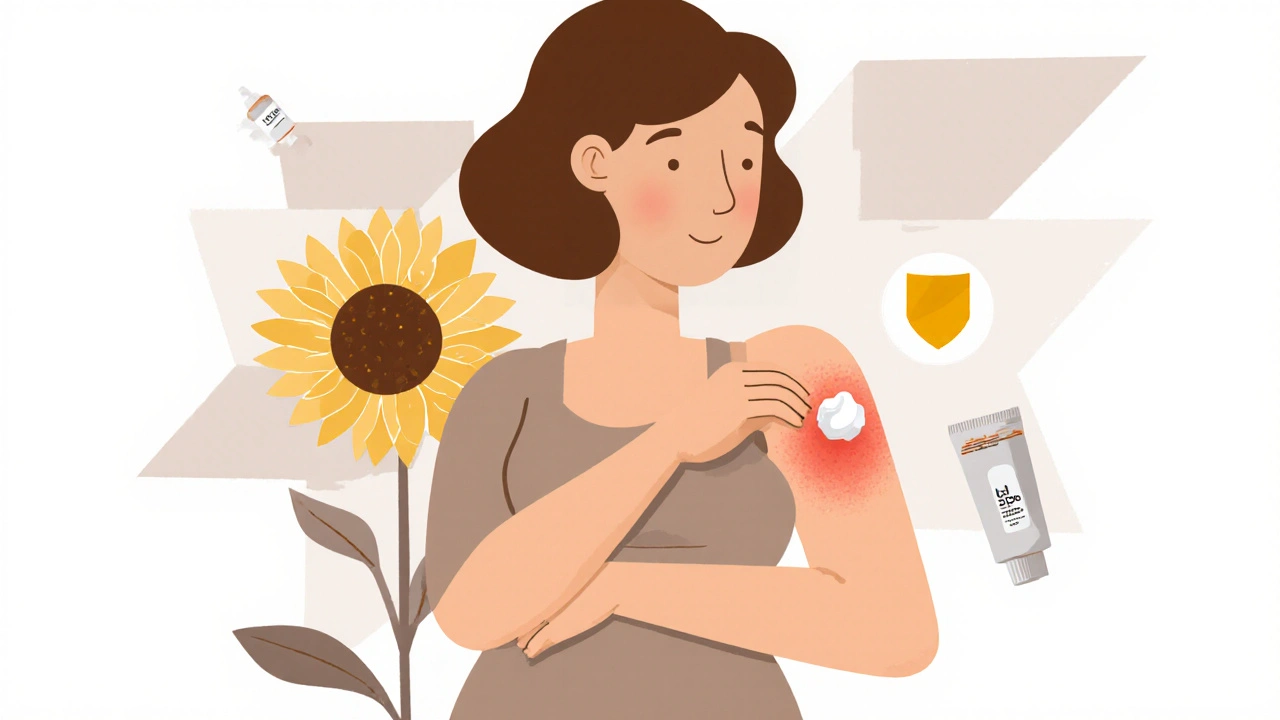When you’re pregnant, even the simplest skincare decision can feel overwhelming. That itchy rash. The sudden breakout. The dark patches on your face. You want relief-but you’re terrified of doing something that could harm your baby. The good news? Most topical medications are far safer than you think. Your skin isn’t a sponge, and what stays on the surface rarely reaches your baby. But not all creams are created equal. Some are fine. Others? Best avoided. Here’s what actually matters.
Why Topical Creams Are Usually Safer Than Pills
Your skin is designed to keep things out. That’s why a cream applied to your arm doesn’t turn into a full-body drug experience. Most topical medications absorb less than 10% into your bloodstream-sometimes as little as 1%. Compare that to swallowing a pill, where nearly 100% enters your system. That’s why doctors often recommend creams over pills for things like eczema, acne, or fungal infections during pregnancy. Still, absorption isn’t zero. And where you apply it matters. Skin on your face, neck, armpits, and groin absorbs more than skin on your forearm or leg. So even a safe cream can become risky if you slather it on thin skin all day, every day.Safe Topical Treatments for Common Pregnancy Skin Issues
Eczema and Itchy Skin: Mild to moderate hydrocortisone cream (1%) is widely considered safe. It’s the go-to for itching, redness, and flare-ups. Studies show no link between short-term use and birth defects. For more stubborn cases, your doctor might suggest a slightly stronger steroid-but only for a few days at a time. Long-term or high-potency use (like clobetasol) has been tied to lower birth weight in rare cases, so stick to the lowest dose for the shortest time. Acne: You’re not alone if breakouts hit during pregnancy. Hormones go wild, and your skin pays the price. The safest options? Benzoyl peroxide (5-10%) and topical antibiotics like clindamycin or erythromycin. These barely enter your bloodstream. A 2023 review in the Journal of Drugs in Dermatology confirmed they’re low-risk when used as directed. Avoid anything with retinoids-yes, even adapalene gel. It’s a topical version of the infamous Accutane, and even small amounts are not worth the risk. Dark Patches (Melasma): Often called the “mask of pregnancy,” this brown discoloration on cheeks and forehead is common. Azelaic acid (15-20%) is your best bet. It’s classified as Category B, meaning animal studies showed no harm, and human data is reassuring. Many women report clear results with no side effects. Avoid hydroquinone-it’s not well studied in pregnancy, and some countries have restricted it. Fungal Infections (Yeast, Athlete’s Foot): Clotrimazole, miconazole, and nystatin are all first-line choices. They’re antifungals that stay mostly on the skin’s surface. No evidence links them to birth defects. Avoid econazole in the first trimester, and use terbinafine only if your doctor says it’s necessary. Herpes Sores (Cold Sores or Genital Herpes): Acyclovir cream is safe and effective. It’s been used for decades in pregnant women with no increase in birth defects. Trichloroacetic acid is also considered safe for warts. But avoid podofilox and podophyllin resin-they’re linked to fetal harm.Topical Medications to Avoid During Pregnancy
Retinoids (Tretinoin, Adapalene, Tazarotene): Even though they’re applied to the skin, these are derivatives of vitamin A. And too much vitamin A can cause serious birth defects. Case reports exist of women using tretinoin cream early in pregnancy and later discovering their baby had abnormalities. The risk might be low, but it’s not zero. The American College of Obstetricians and Gynecologists (ACOG) says: avoid them completely, even before you’re pregnant. Topical NSAIDs (Diclofenac, Ibuprofen Cream): These might seem harmless-after all, they’re just a cream. But they can still enter your blood. And when used after 30 weeks, they’ve been linked to premature closure of a key blood vessel in the baby’s heart (the ductus arteriosus). That can lead to serious heart problems. Skip them after the second trimester. Salicylic Acid (High Dose): Low-dose salicylic acid (2% or less) in acne toners or spot treatments is generally fine. But avoid peels, body washes, or pads with more than 5%. High doses can act like aspirin, which carries risks in late pregnancy, including bleeding complications. Hydroquinone: Used for lightening dark spots, but there’s not enough data to say it’s safe. Some animal studies suggest potential harm. Better to wait until after pregnancy.
What About Over-the-Counter Products?
You don’t need a prescription to get into trouble. Many drugstore creams and lotions contain hidden ingredients. - Neutrogena On-the-Spot Acne Treatment contains benzoyl peroxide-safe. But check the label. Some versions also include salicylic acid. Stick to low concentrations. - Gold Bond or Aveeno Eczema Therapy often contain colloidal oatmeal and ceramides. These are just moisturizers-perfectly safe. - Anti-aging creams with retinol, glycolic acid, or peptides? Avoid. Retinol is a retinoid. Glycolic acid in high doses (above 10%) isn’t well studied. Peptides? Probably fine, but no need to risk it. Don’t assume “natural” means safe. Essential oils like rosemary, clary sage, or wintergreen can be absorbed through the skin and may affect hormones or trigger contractions. Skip them.How to Use Topical Creams Safely
Even safe products need smart use:- Use the smallest amount needed. A pea-sized dab covers a whole palm.
- Apply only where needed. Don’t spread it on your belly unless you’re treating a rash there.
- Avoid large areas. Covering half your body with steroid cream? That’s asking for trouble.
- Wash your hands after applying. You don’t want to transfer it to your eyes or mouth.
- Don’t use expired products. Ingredients can break down and become unpredictable.
- When in doubt, ask your OB or a pharmacist. Don’t rely on Amazon reviews or Pinterest.

What If You Used Something Risky Before You Knew You Were Pregnant?
This happens more than you think. Maybe you didn’t know you were pregnant when you used tretinoin. Maybe you kept using your acne cream for a week before your positive test. Here’s the truth: most of the time, it’s not a disaster. The risk from topical retinoids is real-but it’s not guaranteed. Studies show that even when women used tretinoin early in pregnancy, the actual rate of birth defects was still very low. That doesn’t mean you should keep using it. But if you did, don’t panic. Talk to your doctor. They’ll likely recommend an early ultrasound to check for abnormalities. The bigger risk? Stress. Worrying nonstop won’t hurt your baby-but it’ll wear you out. Get facts, not fear.When to Call Your Doctor
You don’t need to call for every little itch. But reach out if:- Your rash spreads quickly or blisters
- You develop a fever with skin changes
- You’re using a cream for more than two weeks with no improvement
- You accidentally used a retinoid or NSAID cream
- You’re unsure about any product’s ingredients
The Bottom Line
You don’t have to go without treatment during pregnancy. Most topical creams are safe when used wisely. Stick to the basics: hydrocortisone for eczema, benzoyl peroxide and clindamycin for acne, clotrimazole for yeast, azelaic acid for dark spots. Avoid retinoids, high-dose salicylic acid, NSAIDs after 30 weeks, and anything with “retinol” or “tretinoin” on the label. The science isn’t perfect. We still don’t have large studies on every cream. But what we do know? The safest approach is simple: use less, use wisely, and skip the risky stuff.Your skin matters. Your baby matters. You don’t have to choose between them.
Is hydrocortisone cream safe during pregnancy?
Yes, low-potency hydrocortisone cream (1%) is generally safe for short-term use during pregnancy to treat eczema, rashes, or itching. Avoid using it on large areas or for more than a few weeks at a time. Stronger steroids (like clobetasol) should only be used under a doctor’s supervision.
Can I use acne cream while pregnant?
Yes, but only certain ones. Benzoyl peroxide and topical antibiotics like clindamycin or erythromycin are considered safe. Avoid all retinoid-based acne treatments, including adapalene, tretinoin, and tazarotene-even if they’re over-the-counter. These can increase the risk of birth defects.
Is azelaic acid safe for melasma during pregnancy?
Yes, azelaic acid (15-20%) is one of the safest and most effective treatments for melasma (dark patches) during pregnancy. It’s classified as Category B, meaning no evidence of harm in animal or human studies. Many women see noticeable improvement with regular use and no side effects.
Can I use topical NSAIDs like diclofenac cream while pregnant?
Avoid topical NSAIDs like diclofenac after 30 weeks of pregnancy. Even though they’re creams, they can still enter your bloodstream and increase the risk of premature closure of a fetal heart vessel. If you need pain relief before 30 weeks, use the lowest dose for the shortest time and only if your doctor approves.
What should I do if I used a retinoid cream before I knew I was pregnant?
Stop using it immediately and talk to your doctor. While case reports show a small risk of birth defects, most women who used topical retinoids early in pregnancy go on to have healthy babies. Your doctor may recommend an early ultrasound to check for abnormalities. Don’t panic-stress is more harmful than the occasional accidental use.
Are natural or essential oil creams safe during pregnancy?
Not necessarily. Many essential oils (like rosemary, clary sage, wintergreen) can be absorbed through the skin and may affect hormones or trigger contractions. Even products labeled “natural” can contain risky ingredients. Stick to simple moisturizers with ceramides, colloidal oatmeal, or shea butter unless your doctor approves otherwise.
